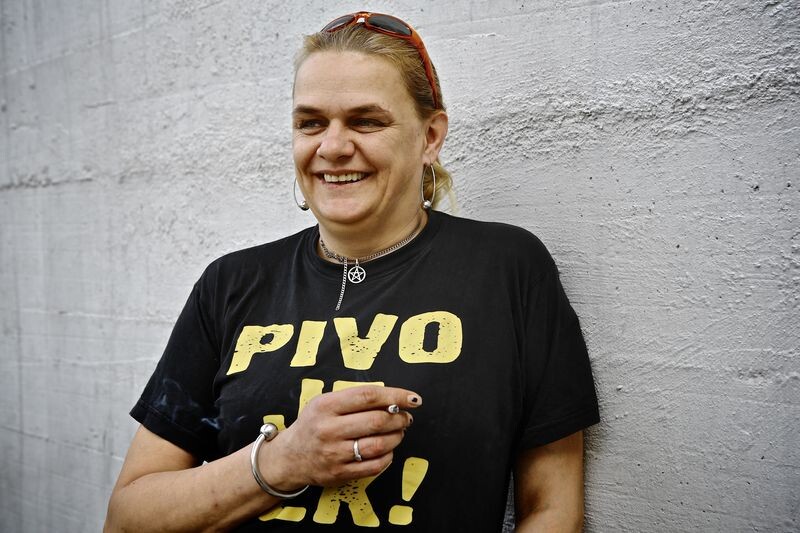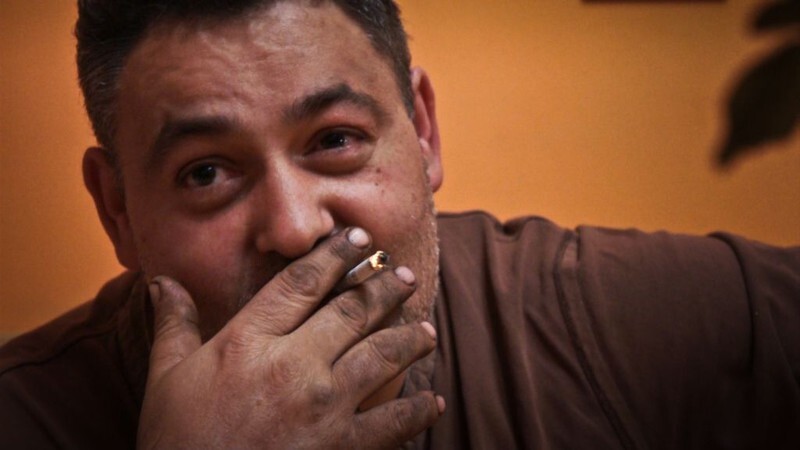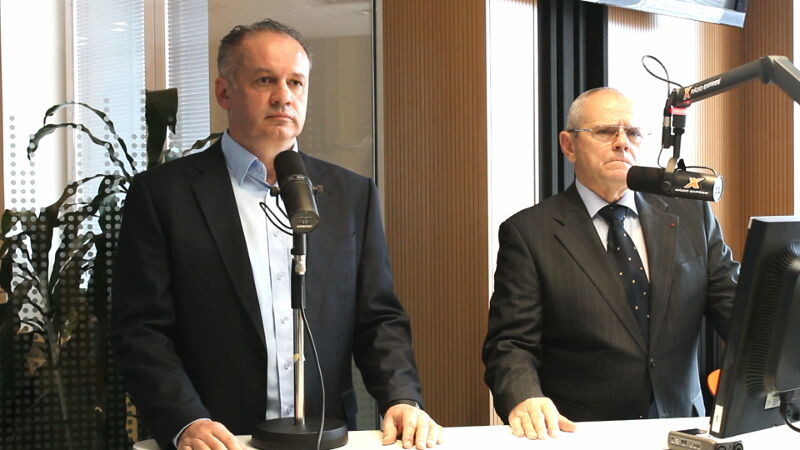Alcohol and Heroin Are All the Same
For 13 years, Mallory has been trying to get rid of her label of a druggie. Her life changed after the birth of her son – she spent 16 days in a drug rehab and started a completely new life. However, it turned out to be rather black-and-white with no way out – Mallory found herself on the street and her son was placed in a mental asylum. We invited drug policy experts – sociologist Martin Nekola (MN), national anti-drug coordinator Jindřich Vobořil (JV), and Šárka Slezáková (ŠS), an expert on observational documentary filmmaking to discuss Helena Třeštíková’s Golden Globe-winning film, Mallory.
ŠS: In the context of Helena Třeštíková’s film works and especially her previous two films about drug addicts, Trapped and Katka, Mallory stands out as the only film that shows life without drugs. As a spectator, you can observe what happens when you decide to quit taking drugs.
JV: When watching the film, I couldn’t stop wondering why such a smart woman – Mallory – doesn’t take advantage of all the possibilities that could help her solve her life situation after quitting drugs. Why is she living in a car when there are shelters for mothers and children? In her case, I can’t see why she wouldn’t be admitted to one of such shelters – which, by the way, are mostly of a pretty good standard – especially if she is friends with people from the Sananim sheltered housing.
MN: I was also puzzled by the role of shelters in Mallory’s story. When I try to explain the difference between social help organised by the state and the non-governmental non-profit sector, I usually emphasise flexibility as the key aspect. And although they would love to help, officials have their hands tied. For example, in the film you can clearly see that the only information they are able to give you is that there’s a lottery on the distribution of flats or that the Sedmidomky hostel is only intended for bad payers from houses owned by the municipality and Mallory is not entitled to stay. In this respect, the non-profit sector is much more flexible and able to help in a crisis situation. It is also more easily within the clients’ reach and better understands their situation and their past experience.
JV: The problem is that the film doesn’t provide the full context. Particularly in this case, I was on the side of Mallory when she was dealing with the authorities, but I’ve seen situations when the clerks were right in their decisions. The film simply lacks context and we don’t have enough information to objectively pinpoint the problem.
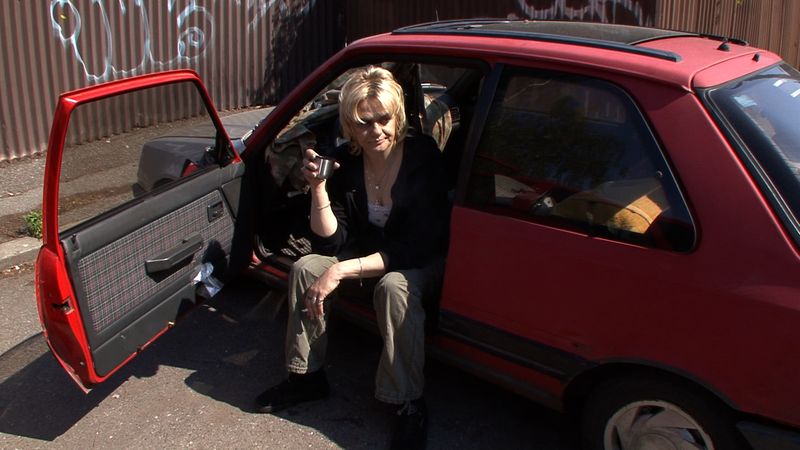
Mallory
Two faces of documentary observation
ŠS: This documentary form, indeed, has two edges. The director is obviously limited to some events in the lives of the protagonists. She is not able to witness all of the major twists in their lives. And all she can offer is her own perspective of the selected events. In documentary observation, the individual director’s approach is much more clear-cut than in other types of documentary films. Třeštíková also does not tell us much about the protagonist’s family and relations; we don’t know anything about her mother, or her partners, who are presented to the audience as shadows or stage props.
JV: I don’t consider this a deficiency on the part of the director. It mainly depends on Mallory, what she finds important to reveal. We can only see her view of the situation, not an exhaustive and complex picture of the events in her life.
MN: And it is not even possible to pay attention to all of the related issues. Why should we be able to find out whether it was right that they fired Mallory, or whether she was or wasn’t rude to the customers. But I greatly appreciated the featured answering machine messages that filled up for the scenes that weren’t captured on camera, although some critics say that they were recorded additionally.
ŠS: Helena Třeštíková does have an answering machine, which in the film functions as a mediator that helps develop the relationship between the director and the protagonist, not only filling in the gaps. Třeštíková is one of the few directors, who influences the events in her observational films. This is not obvious at the first sight and it’s hard to figure out. The film in fact could have had a clear influence on Mallory’s life. For instance, the director and her camera in a certain way influenced the clerks, she perhaps even tried to help or give advice.
MN: On the other hand, camera was also present when the protagonist of the film Katka spoke with the office clerks and the conflicts were much more dramatic. Yes, Katka was in a different position than Mallory, she was often intoxicated when talking to the clerks or her doctor. This again proves that Mallory is a very intelligent woman who knows what her goal is and how to achieve this goal.
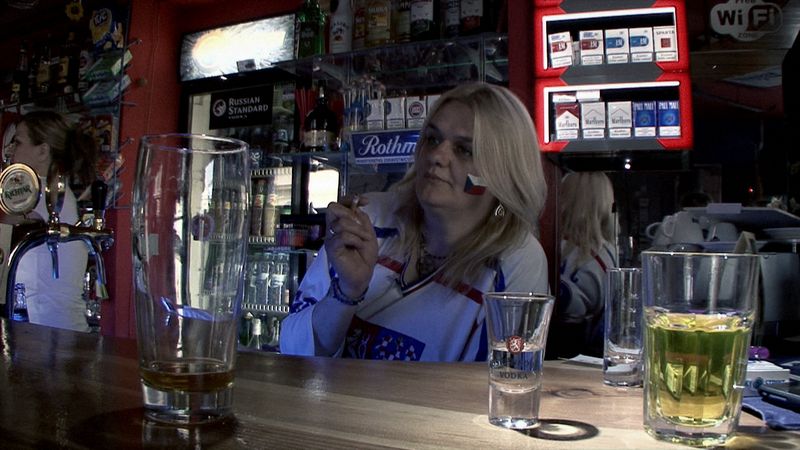
Mallory
JV: It was interesting to watch how Mallory’s face was changing. To me as a practitioner it occurred that she could have been going through some sort of a depression. Perhaps if she had received some treatment for or someone had offered help, she wouldn’t have had to live so long on the street. The whole story could have had a completely different ending. Depression could’ve been the main reason why she was unable to take care of her son whom she in a good will placed in a mental asylum, more or less only to make sure he has a place to stay. However, alcohol was ruining her life much more than hard drugs. It actually played a crucial role in the events. She struggled hard to avoid heroin, and took to alcohol that was ruining her health and life and also prevented her from seeing her son. Plus her partners, too, were alcoholics who used to beat her. What is then the difference between heroin and alcohol abuse? It’s all the same.
ŠS: As I see it, it’s actually rather an ethical question whether her son should have been involved in the film at all, if he clearly wasn’t able to give his informed consent. What about his privacy? The film recounts the story of his whole life, reveals details about his childhood, which can definitely affect the approach of his friends and contemporaries. In my opinion, the director is balancing on the edge – does she have the right to show the story of this little kid in a film?
MN: As I see it, Třeštíková is very cautious regarding privacy issues. The only moments where we can see Mallory’s son, are the two meetings with his mother, which definitely have to be included in the film. She is discreet enough not to mention his school problems. She gave many hints, but that was absolutely OK in my terms. I can’t imagine how the film would work without the scenes showing her son.
JV: Actually, what I personally was lacking was the end of the boy’s story.
Challenging the stereotypes
MN: Mallory can effectively challenge the stereotype of a drug addict whose problem is that her or his will is not strong enough. She managed to handle situations in which people easily go back to their addiction. Going through traumas such as a break-up, loss of job or homelessness, they often fail to resist and take drugs to run away from their problems. This film may be eye-opening for some people and show that drug addicts are not always weak people.
JV: She had to be taken care of already when pregnant. She knew that she couldn’t stop taking heroin until birth because her baby would die, and she also knew that she will go to a drug rehab immediately after that. When you work with someone like that, or give them treatment, your clients often need some intensive moment to move forward, some trigger to realise that they have to change their life. It can come any time, in a tram, looking into someone else’s pram or meeting some benefactor on the bridge who will give them some money and say: you can do it.
ŠS: In the case of Mallory it was the director of the Karlovy Vary International Film Festival, Jiří Bartoška, who didn’t know until the premiere that was held at the festival that a film was being made about her, in which he actually also appeared.
MN: But not everyone who is in need meets a benefactor. All of them should be aware that there are street workers, who selflessly help although they themselves don’t have much money. Mallory too became a street worker and it is always an advantage to have someone with a personal experience with taking drugs and living on the street doing the job. For instance, Katka features scenes when a young street worker tries to convince the drugged protagonist that she is the “measure of everything”. The whole scene made the impression that she was lacking the personal experience and wasn’t able to imagine how a person who is completely out of it feels in such a situation and how she actually perceives the situation.
JV: People with a personal experience are very valuable in organizations where the fluctuation of street workers is quite high. A former addict can speak with the people in the streets using their language, and, unlike fresh school graduates, he or she can send them to hell and be tough with them. Quite recently, we had such a dynamic situation at Sananim where we employed a team of people around 24 years of age and fifty-year-old-guy who was cooking crystal meth for seventeen years.
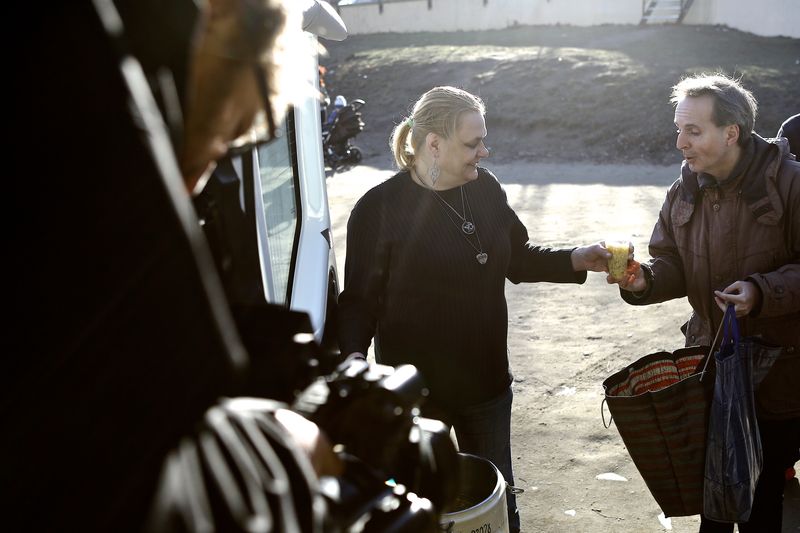
Mallory
Vicious circle
MN: In Prague, the number of cases of active resistance against low-threshold services is on the rise, resulting in the close-down of contact centres or their relocation to more remote areas, often not accessible to the clients. Locals organise themselves in associations thus making our work on this level even more difficult.
JV: This is now a great issue in Prague, the individual districts don’t want to take responsibility thus leaving the task to the city hall. As a result, a single contact centre will be opened for one half of Prague’s addicts which will logically displease the Prague citizens. In the aftermath, many activities are initiated, for example, a ban on smaller contact centres within two kilometres from schools and these unfortunately resonate also in the Parliament. In this sense, the politicians on the local level and sometimes even the government are afraid to lend their ears to professionals and they prefer to appeal to the current moods of the citizens. There are, indeed, efforts to analyse this problem, but the mayors are often afraid of backlash from the citizens and voters.
MN: On the municipal level, we can see some of these attempts because authorities on this level can afford it, unlike local mayors who are facing direct pressure and thwart our praiseworthy efforts. But it is fair to say that in the context of former communist countries and cities, our drug control policy is among the best. But on the other hand, I can see some light at the end of the tunnel. On the global level, we can see a rather strong tendency towards decriminalisation or legalisation of some psychoactive substances. There is some hope.
JV: This will never happen though. The legalisation would have to be supported by the official policy of the USA. It is not enough for only some individual countries to strive for improvements.
Trailer

